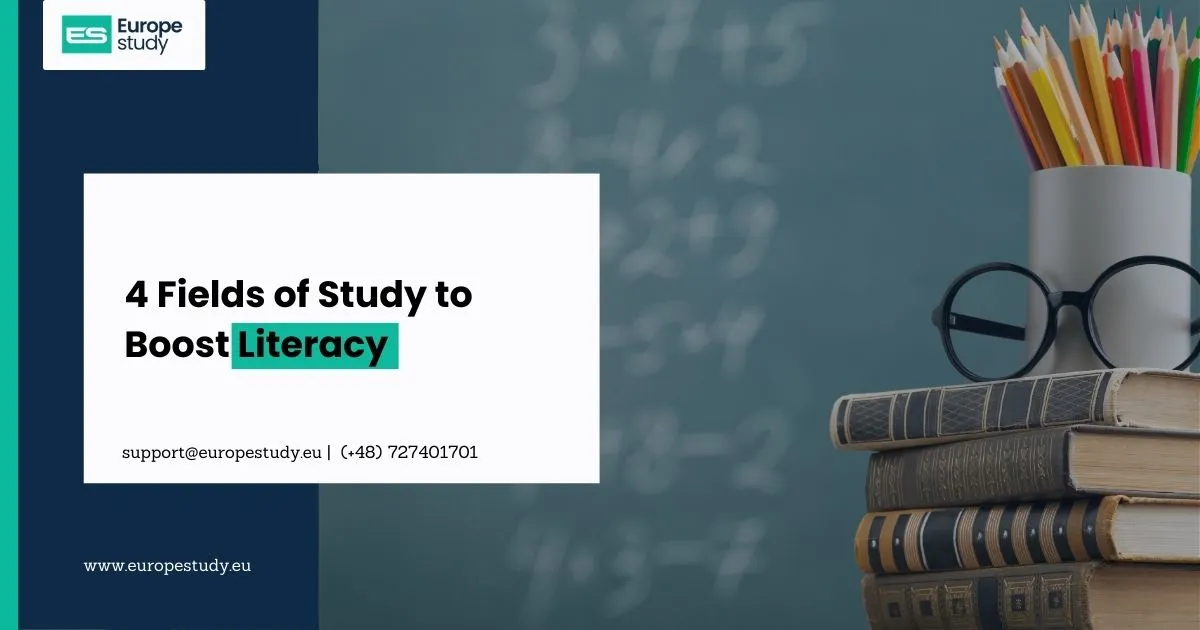
4 Fields of Study to Boost Literacy
Promoting Literacy for Social and Economic Progress
In today’s increasingly complex and interconnected world, strong literacy skills are essential for personal and professional success. Individuals who can read and write fluently have a greater capacity to access opportunities, navigate digital environments, and contribute to their communities. However, literacy challenges remain a pressing issue, even in Europe. According to the European Commission, around 20% of 15-year-olds in the EU lack basic reading skills, while millions of adults struggle with functional literacy. Addressing this gap is vital for fostering social inclusion, employability, and overall well-being.
If you are passionate about promoting literacy, here are four fields of study in Europe that can help you make a meaningful impact.
1. Education and Literacy Studies
Pursuing a degree in education offers the most direct path to improving literacy across Europe. Educators play a crucial role in shaping students' reading and writing abilities, both in early childhood and adult education. With Europe’s diverse linguistic landscape, literacy education is not limited to native speakers. There is a growing need for teachers and specialists who can support migrants and refugees in acquiring literacy skills in the language of their host country.
Career opportunities in this field include becoming a teacher, literacy coach, educational psychologist, special education instructor, or adult literacy tutor. Additionally, you can specialize in literacy curriculum development or education policy, influencing broader literacy strategies at a national or EU level.
Many European universities offer specialized master’s degrees in literacy education, TESOL (Teaching English to Speakers of Other Languages), and language pedagogy. For those interested in research, a PhD in educational sciences or applied linguistics can lead to roles in academia or policy-making.
2. Digital Literacy and Technology
In the digital age, technological literacy is as important as traditional literacy. Yet, according to the European Digital Skills Indicator, nearly 44% of Europeans lack basic digital skills, creating barriers to education, employment, and civic participation. By studying fields such as information technology, digital education, or e-learning design, you can help bridge the digital literacy divide.
Careers in this field include developing educational technology (EdTech) solutions, creating e-learning platforms, and providing digital literacy training to adults and marginalized groups. With the rise of remote and hybrid learning, specialists in digital literacy are increasingly in demand across European schools, companies, and NGOs.
Universities across Europe offer degrees in educational technology, instructional design, and ICT (Information and Communication Technology) education, equipping graduates to tackle digital literacy challenges.
3. Social Policy and Community Development
Improving literacy also requires addressing social inequalities. A degree in social policy or community development can prepare you to work with marginalized populations who often face the greatest literacy challenges, such as migrants, low-income individuals, or rural communities.
In this field, you can work for government agencies, NGOs, or international organizations focusing on social inclusion, education access, and public policy. Roles might include social workers, policy analysts, or program coordinators developing and implementing literacy initiatives.
In Europe, programs in social policy and international development are widely available, often combining coursework with practical experience in public sector or nonprofit organizations. You could also pursue a master’s or PhD in public administration, human rights, or community development to deepen your expertise.
4. International Development and Humanitarian Studies
Literacy is a powerful tool for promoting social justice and economic growth, especially in regions affected by poverty or conflict. Studying international development or humanitarian studies equips you with the skills to promote literacy in global contexts, including through European-based NGOs and development agencies.
Graduates in this field often work in education-focused humanitarian programs, advocating for literacy in developing regions or supporting literacy projects for refugees and displaced populations in Europe. Career paths include project management, advocacy, and fieldwork for organizations like UNESCO, Save the Children, and The European Association for the Education of Adults (EAEA).
European universities offer specialized programs in development studies, humanitarian action, and international education, often including fieldwork placements or partnerships with NGOs.
The Power of Literacy in Europe
Promoting literacy across Europe is more than just teaching people to read—it’s about empowering individuals to access opportunities, participate in society, and lead more fulfilling lives. Whether you choose to study education, technology, social policy, or international development, you can contribute to building a more literate and inclusive Europe.





